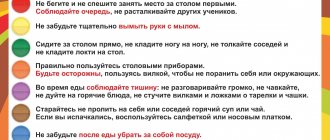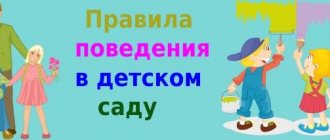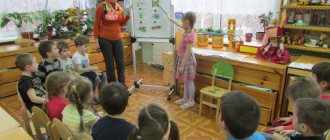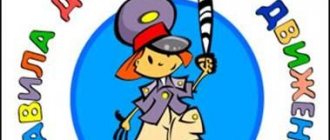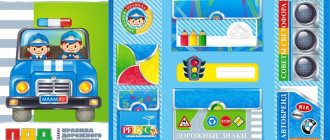Types of teachers' councils
In Soviet times, the processes of education, upbringing and development of preschoolers took place according to standard programs. Today, educators have the right to choose. It is discussed at special meetings, which are held with the participation of the entire teaching staff.
According to the Federal Law “On Education”, it is customary to hold at least 4 assemblies. All discussions are recorded. In accordance with all requirements and standards, several types of teacher councils are held in kindergartens. These include:
- the kick-off meeting is also the first one. It is held, accordingly, at the beginning of autumn. The main tasks and goals of the event are to sum up the results of the past summer period - holidays and approve a new plan and operating mode of the preschool institution. Senior educators and educators prepare especially carefully for it. During training, teachers develop new programs for the development of children, create all the conditions for the implementation of their goals, and at the same time collect and draw up all the documentation. The task of the senior teacher as part of the orientation council is to give recommendations to other teachers on drawing up programs, and at the same time select methodological literature;
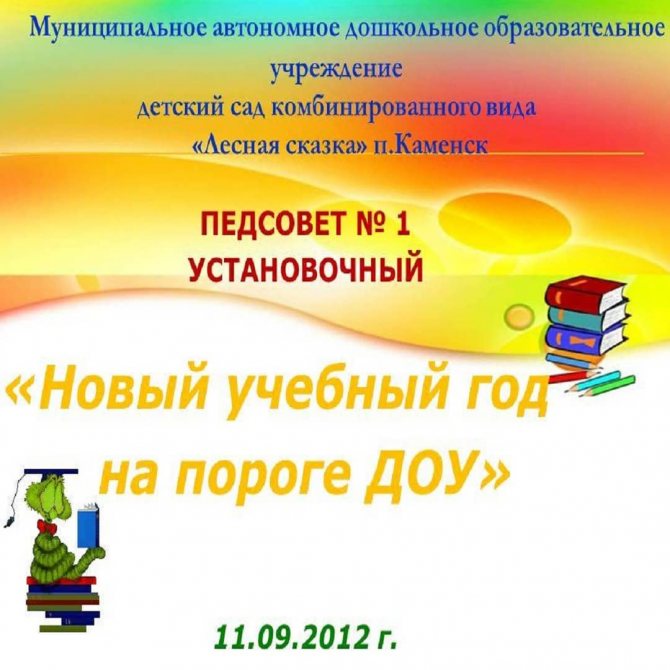
- The current teacher council in kindergartens must be held twice a year. The purpose of the meeting is to discuss the work of the teacher. Preschool employees prepare carefully for the event, preparing open reports on their activities. These reports contain topics that meet all the goals and objectives set at the kickoff meeting. During the teacher’s speech, he shares his experience, the results of the work done, and reports on the effectiveness of his activities. The topic of teacher councils is discussed in advance. As a rule, they are similar from year to year. The most frequently asked questions are on the following topics:
- Development of children of different ages through play.
- Individual approach to the development and education of students.
- Environmental, labor, aesthetic or humane education for preschool children.
- Gender approach to the educational process;

- final meeting - the event takes place at the end of the academic year - in May or June. The purpose of the event is to summarize the results of the past period, draw conclusions and groundwork for the coming year. Before holding the council, kindergarten workers carry out various types of work: interviewing parents, filling out pupils’ development cards. Specialists such as psychologists, speech therapists, health workers, and music directors prepare a report for each child. Taking into account all the performances, a work plan for the summer period is drawn up, and activities for the next academic year are predicted.
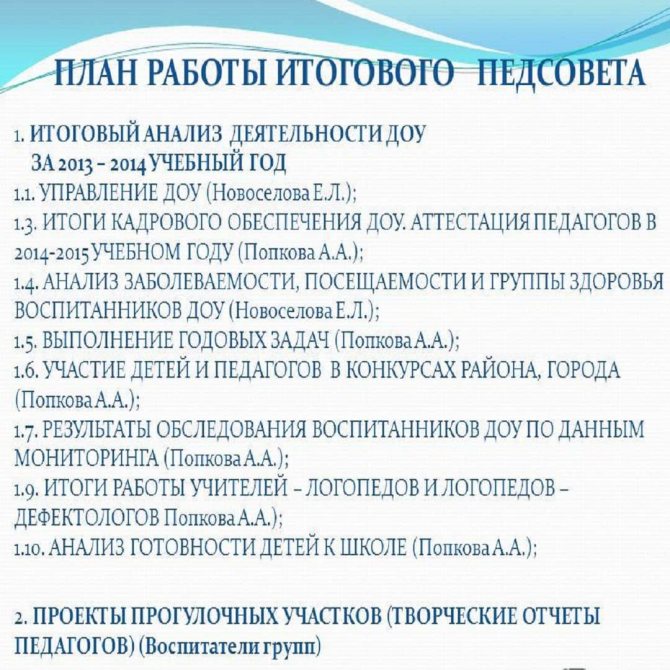
Types and forms of holding pedagogical councils in preschool educational institutions.
Types of teachers' councils
- Installation teachers' council
The name comes from the word “set” introduced into psychology by D.N. Uznadze, and means readiness for a certain activity depending on the presence of a need and the objective situation, its satisfaction.
The mission of the orientation teachers' council is to create conditions for a reassessment of values, to try to change the opinions, views, judgments and ideas of the teacher about children, to awaken the desire to learn new things, to create conditions for the development of the child's personality.
The convention of the name “setting” is obvious, since any teachers’ council is called upon to work to change the teacher’s attitudes. This teachers' council provides guidance for the new school year.
- Thematic teachers' council
This type of teacher council is dedicated to a specific topic. The topic is determined by the annual task of the preschool educational institution or an emerging problem that needs to be solved.
The formulation of the topic is the central mechanism for focusing the attention and inspiration of all members of the teachers' council.
The title of the topic should not be long, dry, listing goals and objectives.
- Final teaching council
The purpose of such a teachers' council is to analyze the results of the academic year, identify and define strategic and developmental problems.
It is important to pay serious attention to the preparation of such a teacher council, so that the entire team is involved in the analysis of what has been done during the school year, to determine their successes and failures.
Conditional division
pedagogical councils
according to the form of organization
- Traditional
- this is a teachers' council with a detailed agenda, held with strict adherence to the regulations on each issue and making decisions on them.
- Teachers' council using separate activation methods
teachers.
During the meeting, the chairman may invite participants to solve a crossword puzzle, a situational problem, or use the “game modeling” method.
- Non-traditional teachers' council
. Its preparation requires writing a script, dividing participants into teams and assigning roles.
IMPORTANT: the result of the work of any teachers’ council should be the adoption of decisions to improve the work of the team.
Forms of conducting
thematic teaching councils
- Teachers' Council - a business game
Can be used to summarize the work of a team on a particular issue or for a certain period. The main place in such a teachers' council is occupied by group activities.
- Teachers' council-conference
May consist of several components. For example, the main message and dialogue, which is organized by the senior educator together with a group of specialists. The answers of these specialists to the questions asked will encourage all participants to ask questions, discuss, develop the topic, and express their opinions.
- Teachers' Council "Round Table"
To prepare it, it is necessary to collect important, interesting issues for discussion, and think through the organization. To do this, some questions can be given to a group of teachers in advance. They will be able to get acquainted with different theories, approaches, opinions and think about their point of view on this issue (topic). It is important to choose a facilitator who can quickly navigate the issues and guide the discussion.
- Situational teachers' council
One or more pedagogical situations are considered, which can be played out here by pre-prepared participants of the pedagogical council. You can discuss the situation based on the footage recorded on camera.
- Teachers' council-discussion
Teachers are divided into groups in advance and prepare their concept of the problem being discussed. During the discussion, a plan to solve the problem is jointly thought out.
- Pedagogical Council "Scientific and Practical Conference"
This teacher council can be prepared and held by combining the efforts of several preschool educational institutions. It is important to draw up an agenda so that each preschool educational institution, under the same conditions, can participate on equal terms in presenting its experience, discussing problems and proposals for developing solutions.
- Pedagogical Council "Auction"
Teachers come to such a pedagogical council with ready-made ideas, with their own solutions, which they offer to others. The teacher justifies these ideas and decisions, reveals (“praises”), and uses various techniques (visual, verbal, practical). At the end of the teachers' meeting, the creative group selects ("buys") the most interesting and innovative ones for execution.
- Pedagogical council excursions, travel.
This form of teachers' council involves the use of several premises, and maybe even buildings. For example, a teacher’s meeting on the topic of recreational work can be held using the premises
- Methodical office
- Gym, swimming pool
- Medical office
- Teachers' council is a process.
A teachers' council of this form is structured according to the type of trial in which there are prosecutors, accused, defense, and jurors. During such a teachers' meeting, some problems of the preschool educational institution are usually identified. At the same time, both positive and negative aspects of any issue or phenomenon are determined.
- Teachers' council - brainstorming
The brainstorming method was put forward by the American naval officer Alex Osborne in the 40s of the twentieth century. This method involves putting forward various hypotheses, problems, and ideas. Everyone says what they think on this issue. However, criticism of statements is prohibited.
There are two types of brainstorming
:
—straight
– putting forward advantages and tasks to solve positive factors:
— back
– identifying the maximum number of shortcomings and searching for their elimination.
Rules for conducting pedagogical discussions
Hosting an event is not that easy. You need to know the key rules. Teacher councils in kindergarten should be held as follows:
- the entire teaching staff of the preschool institution must be present;
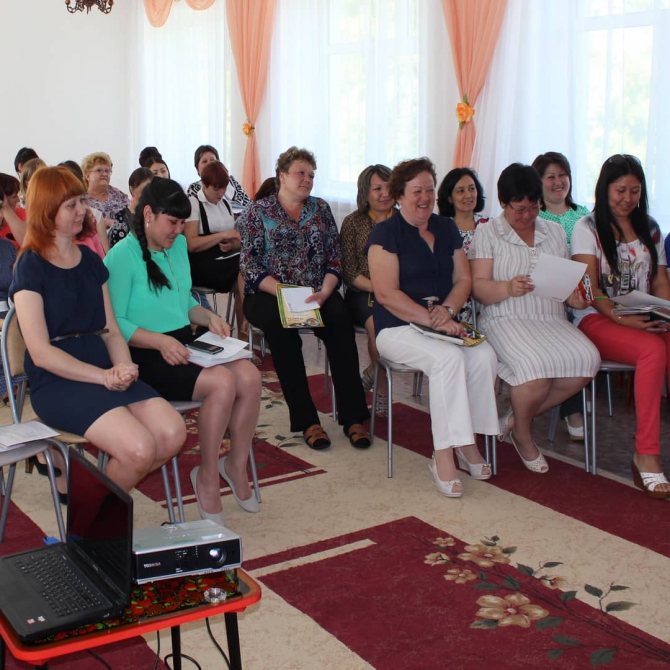
- must pass at least 4 councils throughout the year;
- the schedule of meetings is regulated at the legislative level;
- there should be several speakers;
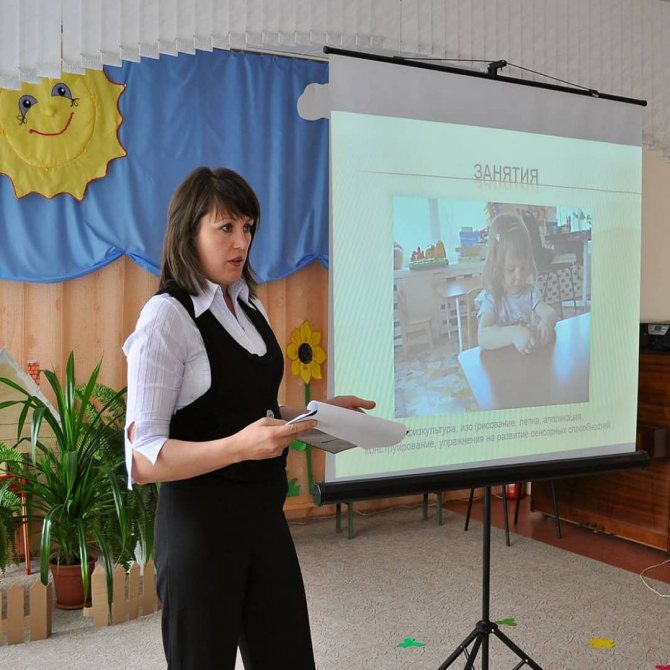
- Minutes must be kept at every event. It will look like a stitched magazine. All entries will be handwritten and pages will be numbered. When filling out, all teachers presenting a report, the topics of their speeches, discussions and decisions are indicated. At the event itself, the secretary of the teachers' council writes a draft, and after 5 days presents the finished protocol;
- The results of teachers' councils must be maintained properly. The minutes indicate the date, number of the event, the number of all teachers present and absent teachers, the topic of the event, the agenda, the goals of the meeting, the results of the discussion achieved;
- The topics of all councils are regulated by the annual plan of the preschool educational institution at the beginning of each academic year.
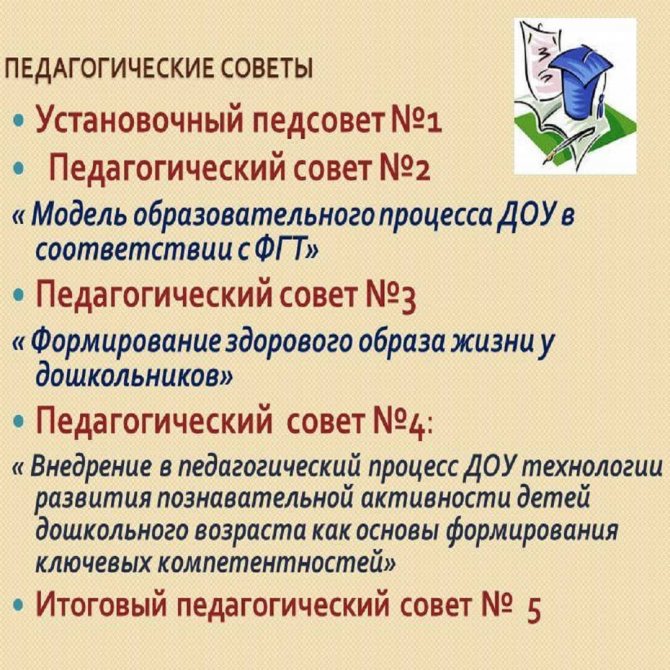
REPORT FOR THE TEACHING COUNCIL ON THE TOPIC: "CHILDREN'S PLAY IN THE EDUCATIONAL PROCESS OF PRECEPTION OWE"
These could be, for example, positions related to work activities (such as
in the game of shopping), the roles of soldiers and officers in combat, etc. These are the games
most significant for the development of a child aged 4-6 years. Many teenagers and
adults, by the way, are also partial to such games; there is even a whole
subculture of “role-players”.
—Games with rules
. They represent artificial situations, often not
having direct and obvious parallels with real life, in which people
act on the basis of pre-formulated rules. Most often this is accompanied
competition. This group includes, for example, sports games - football, hockey or
volleyball, as well as various kinds of children's hide and seek, tag, shootouts, etc. Similar
games begin to predominate at primary school age, but persist further,
Most adults are not indifferent to some of them.
In addition to the types of games described above, there are also various types
games:
creative - arise on the initiative of children (include plot-role-playing; theatrical-
new-director's, dramatization games; design); didactic - occur according to
initiative of adults with ready-made rules for solving a learning task, maybe role-playing. They are the main form of training for preschool children; folk - created by the people.
What are the functions?
does the game do?
The first function of the game is educational
- contributes to the development of the child as a person:
the ability to express oneself, realize one’s needs, be aware of one’s likes and dislikes, explore one’s feelings, and learn to control one’s behavior. Some games
develop strength, endurance, and others - intelligence.
The second function is compensatory
- is based on the fact that the game appears as a different reality; the child is attracted by the opportunity to reveal his abilities, which are difficult to develop in the adult world.
The third function is psychotherapeutic
(healing), in the game, situations that worry a child are “lived” with the full attention and empathy of an adult. While playing, the child splashes out negative emotions, thereby reducing their tension, and finds ways out of difficult situations.
Another function is diagnostic
. In the game you can see the child’s problems, see how he imagines his parents, teachers, and himself. In the game the child reveals himself, since it is symbolic, everything is “make-believe.”
While playing, the child gains certain knowledge, skills, develops memory, thinking, speech... In classes with preschoolers, teachers for better learning
educational material uses a large number of gaming techniques. Special educational games (“Odd Four”, “Puzzles”, “What First, What Then” and others) help the child learn about the world in a more accessible and exciting way.
